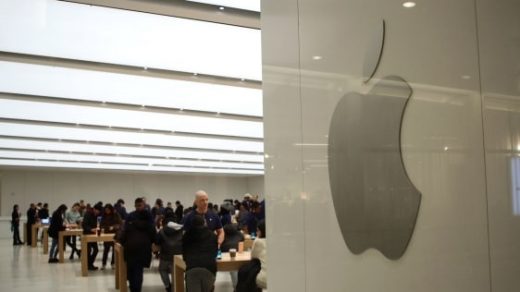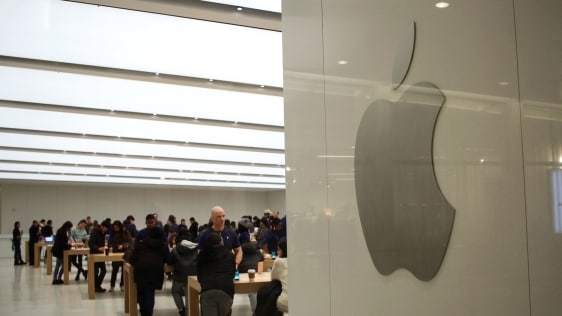The New Tax Law Gives Apple Plenty To Look Forward To In 2018
On paper at least, Apple looks to be among the biggest winners from the new GOP tax code that is headed to President Trump’s desk for his signature. The new code makes it much less expensive for big U.S. multinationals to bring home the hoards of cash they’ve hidden away from Uncle Sam in foreign subsidiaries.
While Apple leaves more cash overseas than any other tech company, it’s most likely to take a measured approach to how much it brings home and how it spends the money.
While some analysts have projected that Apple will repatriate about $200 billion of the roughly $252 billion held in overseas affiliates, a source with knowledge of the matter tells Fast Company that the company will bring home only about half of its overseas stash.
A Quarter-Trillion Dollars At Stake
Many big U.S. tech companies park cash overseas to avoid the 35% corporate tax rate they’d incur when bringing it back home. But Apple takes this practice to an extreme. As of the end of September, it held 93.7% (or $252 billion) of its $269 billion in cash and cash equivalents in overseas affiliates.
The new GOP tax bill would impose a 15.5% tax burden on all that cash—and just 8% for hard assets such as equipment and inventory—upon return to the U.S.
The Trump Administration wanted the repatriation tax to be just 10%. But the rate rose higher as Republicans sought ways to pay for the expensive items in the tax bill, like tax breaks for wealthy Americans and corporations.
Trump hopes that U.S. tech companies will use the repatriated money to create new jobs at home. If history is a guide, the newly enriched companies will spend most of the money on share buybacks, investor dividends, and executive salary increases. That’s what happened when George W. Bush tried a one-time “tax amnesty” in 2004.
However, Apple CEO Tim Cook has on several occasions made a loose connection between the coming tax reform and job creation in the U.S. Here he is speaking to NBC’s Lester Holt in a November 1st interview:
Meanwhile, Apple CFO Luca Maestri has said it’s more likely that any repatriated money would be used for typical expenditures like buybacks and dividends.
Jobs—But Not Apple Jobs
In the end, it’s likely Apple will use some of the money to reward shareholders, and some to help create new U.S. jobs.
Maestri, speaking at a Goldman Sachs investor conference in February, said it would be difficult for Apple to increase the relatively small amount of manufacturing it does in the U.S.
The jobs the company is most likely to help create aren’t for new Apple employees–they’re positions at its suppliers. In May Apple announced a new $1 billion fund to make investments in U.S. companies, which in turn will create new jobs. The company very recently announced a new $390 million investment in Finisar, the Texas company that makes lasers for the iPhone X’s facial recognition system. Some of that money could be used to expand Finisar’s operations in Texas.
The repatriated money isn’t likely to touch off an acquisition spree at Apple. The company’s acquisitions over the past five years haven’t had much to do with its financial situation at any given time. They relate more to specific technology and engineering needs in the development cycles of future products.
Repatriation Games
Aside from the repatriation money, Apple and other multinationals will be taxed in a radically different way next year. Not only will the rate be cut from 35% to 21%, but the GOP tax bill describes a “territorial” system where only income earned in the U.S. is subject to income tax. Profits earned and taxed in foreign countries are considered automatically repatriated and can be brought home. Companies can even be credited for taxes they’ve already paid to foreign governments on the returning cash.
On its own, this should be enough to keep the stock market’s streak of all-time highs going. Apple is likely to have sparkling quarterly results throughout 2018, fueled by the popularity of the $1,000 iPhone X and helped by tailwinds from tax relief.
The tax bill was the number-one policy issue for tech companies this year, and they’re about to get a big Christmas present from Uncle Sam.
That may be great for Apple and other wealthy tech companies, but big Christmas presents cost big money and this one was bought on credit. The GOP tax bill will add $1.4 trillion to deficits over the next 10 years, and will add a trillion to deficits even if the tax cuts fire up the economy as promised, according to a preliminary analysis by the Joint Committee on Taxation (aka the “congressional scorekeeper”).
Even if Apple has a strong 2019, the company needs to keep tabs on the new tax law’s long-term impact on middle-class consumers. Their short-term tax breaks will begin to expire in the first half of the next decade, potentially leaving them with less expendable income to buy costly niceties such as new iPhones.
But for Apple even that factor could be mitigated by the fact that much of the company’s growth in the next decade will likely come from large emerging markets like India and China. And now it will be much easier to bring those profits back home to the U.S.
An Apple spokesperson chose not to add to the company’s earlier statements on taxes for this story.
Fast Company , Read Full Story
(39)














